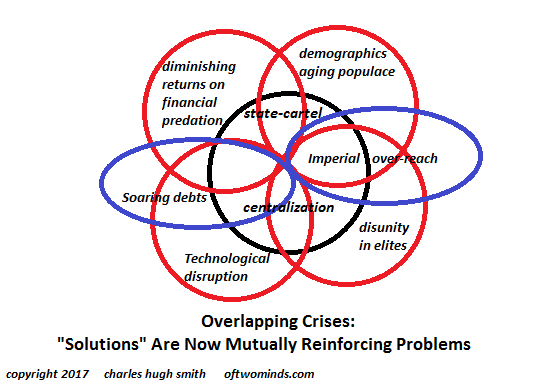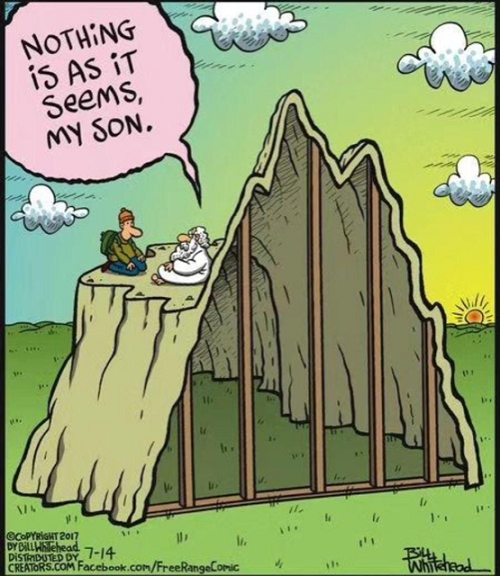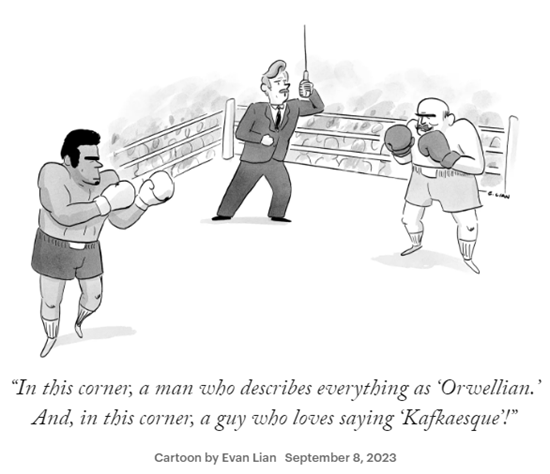What’s valuable is flexible, entrepreneurial, experiential-based skills that can be applied to a variety of problems–including those that have yet to arise.
Finding or creating a job with real upside–and keeping it–has been increasingly challenging for a long time. Globalization exposed the economy and workforce to unprecedented cost-cutting competition, and automation ate away at work that could be reduced to routines. Now AI is introducing a new level of automation to sectors that had heretofore been protected.
We can summarize the situation thusly: if AI doesn’t disrupt the sector you work in, something else will.
I’ve been thinking about work, jobs, money, automation, AI and the economy for many years, thoughts that resulted in my books
Get A Job, Build A Career, And Defy A Bewildering Economy (2014), A Radically Beneficial World: Automation, Technology and Creating Jobs for All (2015),
Money and Work Unchained (2017) and
Will You Be Richer or Poorer?: Profit, Power and A.I. in a Traumatized World (2019).
If I had to boil it all down to a few paragraphs, I’d start with this:
1. Enterprises and governments are fundamentally problem-solving entities. They organize labor, capital and tools to solve problems. This clarifies our understanding of the value of human work: we’re all solving problems of one kind or another. Those who can solve a variety of problems will always be in demand somewhere in the society and economy.
2. We’re told to acquire credentials as evidence of our knowledge, but the more direct path is to accredit ourselves by demonstrating and recording our real-world problem-solving skills. Diplomas accredit the completion of a course of study, but they don’t actually accredit knowledge or problem-solving skills that can be usefully applied in the real world. We serve our best interests by accrediting those ourselves.
3. The world is over-supplied with credentials which don’t actually accredit what employers and customers value most. The net result is the value of credentials is declining, as there is a mismatch of supply and demand: what’s valuable is flexible, entrepreneurial, experiential-based skills that can be applied to a variety of problems–including those that have yet to arise.
4. Self-knowledge is as essential as problem-solving skills. We cannot fully realize our potential until we identify our core interests, talents and character traits, and align them with what I call the eight essential problem-solving skills. Nobody is talented in every facet, and so we have to choose work that leverages what we’re good at and find interesting, and compensate as best we can for what we’re only passable at managing.
As an author, it’s a rare and precious thing to receive the highest possible honor, which is to find that something we wrote provided some bit of useful knowledge and encouragement to an individual who made good use of it. I recently received such an honor from reader Jenna Tucker, whose account embodies everything I try to communicate about acquiring self-knowledge, understanding the economy as it changes, accumulating valued skills and finding ways to apply them to further one’s own career in ways that benefit employers, customers and our community:
“Dear Charles Hugh Smith, I was so happy to see that you have a presence on Patreon, as I have been wanting to write you a thank you letter for a handful of years now. I read your book
Get A Job, Build A Career, And Defy A Bewildering Economy after I had moved across the country to grad school and in the first term of my two year program recognized the career field I was pursuing was rapidly collapsing. I decided to stay and assemble an interdisciplinary study of my own choosing. I knew that I would need to find another career field and was looking for alternative strategies.
Your ideas aligned so well with my own intuitive sense of things. The affirmation and the added clarity and practical advice made all the difference for me. That handful of tools from understanding the S-curve to finding skills with steep and ongoing learning curves to creating a master work history as a basis for creating resumes and seeking references was so thoughtful and potent. Thank you so much for taking the time to write this book. The good will and generosity meant such a great deal to me in the most practical, tangible way.
I was always a talented and responsible kid, and I had been looking for advice from a well-intentioned and wise person older than I was across decades. And I did not find anything as useful as what you conveyed in your little book. I first found and read a book about how to manage money at 18 before going to college and read many more books over the years. They all had what amounted to the same advice, which I followed strictly. And yet I was nearing my 30s still hovering so close to a return to food insecurity, and no amount of responsibility or excellence seemed to be changing the pattern in a truly meaningful way.
I had no example or guidance beyond being told to do great in school, go to college, and keep a strict budget, which I did religiously. Yet in the years before I read your book, the most I had made in a tax year was $27K. Since then, I have pivoted into more lucrative career paths three times, and I just prepared taxes for my first year of making a six-figure income over $100K working as a self- and community-taught software engineer. Please know that your work was very much needed, cherished, and appreciated by this particular reader and patron. And thank you again!
Jenna Tucker”
Thank you, Jenna, for sharing your inspirational journey with us. I honor your well-earned success. You have accomplished so much and by sharing your own story, you’re helping others advance on their own journey.
Here are four snapshots of the economy and working in that economy:




My recent books:
Disclosure: As an Amazon Associate I earn from qualifying purchases originated via links to Amazon products on this site.
The Asian Heroine Who Seduced Me
(Novel) print $10.95,
Kindle $6.95
Read an excerpt for free (PDF)
When You Can’t Go On: Burnout, Reckoning and Renewal
$18 print, $8.95 Kindle ebook;
audiobook
Read the first section for free (PDF)
Global Crisis, National Renewal: A (Revolutionary) Grand Strategy for the United States
(Kindle $9.95, print $24, audiobook)
Read Chapter One for free (PDF).
A Hacker’s Teleology: Sharing the Wealth of Our Shrinking Planet
(Kindle $8.95, print $20,
audiobook $17.46)
Read the first section for free (PDF).
Will You Be Richer or Poorer?: Profit, Power, and AI in a Traumatized World
(Kindle $5, print $10, audiobook)
Read the first section for free (PDF).
The Adventures of the Consulting Philosopher: The Disappearance of Drake (Novel)
$4.95 Kindle, $10.95 print);
read the first chapters
for free (PDF)
Money and Work Unchained $6.95 Kindle, $15 print)
Read the first section for free
Become
a $1/month patron of my work via patreon.com.
Subscribe to my Substack for free
NOTE: Contributions/subscriptions are acknowledged in the order received. Your name and email
remain confidential and will not be given to any other individual, company or agency.
| Thank you, Gdog ($10/month), for your magnificently generous subscription to this site — I am greatly honored by your support and readership. |
Thank you, Michael J. ($8/month), for your marvelously generous subscription to this site — I am greatly honored by your support and readership. |
| Thank you, Foggy ($54), for your splendidly generous contribution to this site — I am greatly honored by your support and readership. |
Thank you, Charles M. ($54), for your outrageously generous contribution to this site — I am greatly honored by your steadfast support and readership. |
